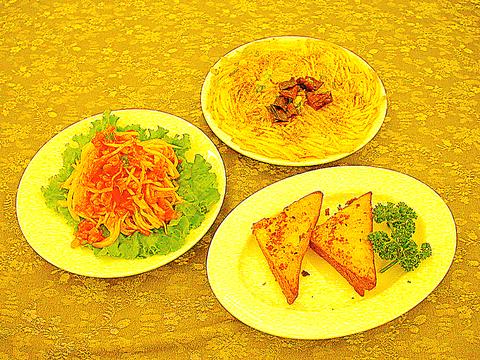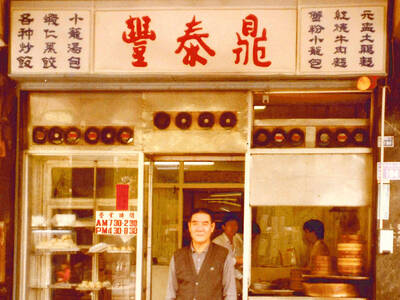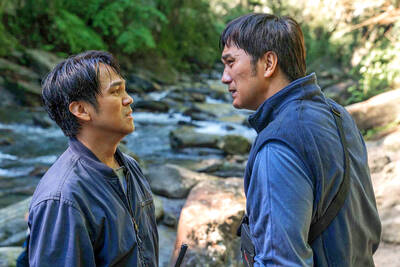Ren He Yuan is probably the most time-tested and authentic Yunnan restaurant in Taiwan. The fact that it is always full of customers testifies to the excellence of its cuisine. Although the restaurant never promotes itself as an "old shop," almost all of its regulars know that it started some 50 years ago and has moved and expanded several times because of its increasing popularity.
Trained under experienced Yunnan chefs, Ren He Yuan's cooks are good at turning seemingly homely dishes into delicacies. "There's no real spectacular or grandiose dish in Yunnan cuisine. Yunnan cuisine is composed of all kinds of homemade dishes," said Yao An-chin (姚安琴), proprietress of Ren He Yuan.
Yao knows the cooking style like the back of her hand, partly because of her background. Yao's father was a civil war veteran who took his Yunnan wife with him when the KMT government moved to Taiwan half a century ago. The veteran's community where they lived was nicknamed "Yunnan village" due to the presence of a large number of couples of that ethnic background. The community, in Taoyuan County's Pincheng, has remained one of the few places where you can find authentic Yunnan cuisine in Taiwan.

PHOTO: VICO LEE, TAIPEI TIMES
Dishes range from the exotic to the mundane. Their spicy stir-fried frogs (NT$248), tree roots with sweet sauce (NT$188), bamboo bugs with salt and pepper (NT$208) are Yunnan specialties rarely seen in Taiwan.
More common dishes such as guochiao rice noodles (NT$128) and bousu steamed buns (NT$20) are also on offer. This exclusive innovation is no less tasty than the traditional version. The buns, which come in sesame, ham and sugar filling and red bean filling, are among the best in Taipei. The sesame, ham and sugar filling is only moderately sweet but leaves a lingering taste.
One popular dish is eggplant with tomato and pork bits (NT$248). Like most other dishes in Ren He Yuan, it tastes naturally light, though the item is usually made to taste stronger and sometimes greasier in its place of origin. Frogs jumping over stone slabs (NT$288) contains peas instead of frogs, as "frog" is Yunan slang for "pea". The stone slabs are actually Yunnan cheese. However, the rarely available ingredient has been replaced by Taiwanese bamboo shoots. This has made the dish popular with the health-conscious.
As the restaurant has in recent years been increasingly popular with Japanese customers, which often outnumber local customers, it now also offers non-Yunnan dishes of fish and tofu to cater to Japanese tastes.
Although there is a long list of items on the menu, many dishes are not always available. These mostly include vegetables particular to Yunnan but difficult to import in large amounts.

March 24 to March 30 When Yang Bing-yi (楊秉彝) needed a name for his new cooking oil shop in 1958, he first thought of honoring his previous employer, Heng Tai Fung (恆泰豐). The owner, Wang Yi-fu (王伊夫), had taken care of him over the previous 10 years, shortly after the native of Shanxi Province arrived in Taiwan in 1948 as a penniless 21 year old. His oil supplier was called Din Mei (鼎美), so he simply combined the names. Over the next decade, Yang and his wife Lai Pen-mei (賴盆妹) built up a booming business delivering oil to shops and

Indigenous Truku doctor Yuci (Bokeh Kosang), who resents his father for forcing him to learn their traditional way of life, clashes head to head in this film with his younger brother Siring (Umin Boya), who just wants to live off the land like his ancestors did. Hunter Brothers (獵人兄弟) opens with Yuci as the man of the hour as the village celebrates him getting into medical school, but then his father (Nolay Piho) wakes the brothers up in the middle of the night to go hunting. Siring is eager, but Yuci isn’t. Their mother (Ibix Buyang) begs her husband to let

The Taipei Times last week reported that the Control Yuan said it had been “left with no choice” but to ask the Constitutional Court to rule on the constitutionality of the central government budget, which left it without a budget. Lost in the outrage over the cuts to defense and to the Constitutional Court were the cuts to the Control Yuan, whose operating budget was slashed by 96 percent. It is unable even to pay its utility bills, and in the press conference it convened on the issue, said that its department directors were paying out of pocket for gasoline

On March 13 President William Lai (賴清德) gave a national security speech noting the 20th year since the passing of China’s Anti-Secession Law (反分裂國家法) in March 2005 that laid the legal groundwork for an invasion of Taiwan. That law, and other subsequent ones, are merely political theater created by the Chinese Communist Party (CCP) to have something to point to so they can claim “we have to do it, it is the law.” The president’s speech was somber and said: “By its actions, China already satisfies the definition of a ‘foreign hostile force’ as provided in the Anti-Infiltration Act, which unlike